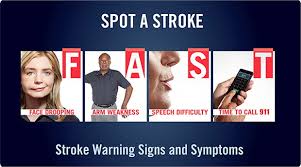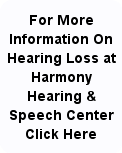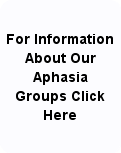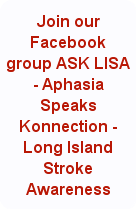Advanced Speech Pathology
(631) 849-6499
Providing Comprehensive, Compassionate Care For Over 25 Years
 | ||||||
 | ||||||
Be Aware Of The Signs Of A Stroke
Watch this informative video presentation, "Know the signs of a stroke"
What Is A Stroke?
A stroke, sometimes referred to as a “brain attack” occurs when blood flow to the brain is interrupted. The medical term used for stroke is “cerebral vascular accident”. A stroke may cause one or more of the following deficits to occur:
• Paralysis or weakness to the muscles in arms or legs, usually on one side of the
body
• Loss of feeling to the limbs or face
• Problems with speech intelligibility
• Difficulty understanding and or using language to communicate
• Problems with swallowing
• Problems with memory and reasoning skills
• Problems with vision and visual perception
• Problems with hearing and processing auditory information
Strokes can be mild or very serious and may cause coma or even death.
How Common Is Stroke?
According to the U.S. Centers for Disease Control and Prevention, stroke is the third leading cause of death in the United States. Stroke is the leading cause of long term disability in the United States. Strokes can occur at any age, but is more common in people over the age of 65 years. The risk for having a stroke doubles with every decade thereafter. On average, someone in the United States has a stroke every 40 seconds. Smoking increases the risk for suffering stroke. High blood pressure is the most important risk factor for stroke.
The most important fact in preventing permanent damage from a stroke is to seek immediate medical treatment.
What Causes A Stroke?
There are two major causes of strokes:
• Ischemic stroke – which is caused by a blood clot that results in blocking a vessel or artery in the brain. This type of stroke is more common and accounts for about 80 percent of all strokes.
• Hemorrhagic stroke – which is caused by a blood vessel in the brain that ruptures or bursts and bleeding occurs in areas of the brain. This type of stroke accounts for about 20 percent of all strokes.
Another type of stroke is often referred to as a “mini” stroke. This is a transient ischemic attack or TIA, that occurs when the blood supply is interrupted very briefly.
What Are The Signs Of A Stroke?
The important fact to remember is that signs of a stroke happen quickly or all of a sudden, sometimes without any warning.
Signs of a stroke may include any one or more of the following:
• Sudden weakness or numbness to the arm, leg or face usually on one side
• Sudden difficulty speaking
• Sudden difficulty understanding speech
• Sudden confusion
• Sudden difficulty with vision in one or both eyes
• Sudden difficulty walking or maintaining balance or coordination
• Sudden dizziness
• Sudden headaches
What Are The Communication Problems Resulting From A Stroke?
• Aphasia – is an inability to use or understand language. There are several types
of aphasia that may result from a stroke. The two most common types of aphasia
are Broca’s aphasia and Wernicke’s aphasia. Damage to the frontal area of the
brain referred to as Broca’s area causes expressive aphasia or Broca’s aphasia.
Individuals with expressive aphasia will have difficulty with oral expression
(speaking) and written expression (writing). Damage to the rear portion of the
brain referred to as Wernicke’s area causes receptive aphasia. Individuals with
receptive aphasia will have difficulty understanding spoken or written language
and will have speech that is jargon like or speech that does not make sense.
Another type of aphasia that may result due to a stroke is global aphasia. Global
aphasia occurs due to extensive damage to several areas of the brain that
control language function. The ability to communicate is severely compromised
in individuals with global aphasia since they cannot use language to convey
even a simple thought or understand the meaning of language either spoken or
written.
• Dysarthria – is an inability to speak clearly due to muscle weakness or paralysis
of the oral structures which may include the tongue, lips, and muscles of the
face. Weakness or paralysis of these structures prevents the individual from
making precise, rapid, integrated and coordinated movements which are
necessary for adequate speech intelligibility.
Is Swallowing Affected By A Stroke?
Yes. Some individuals will have swallowing difficulties due to the stroke which may result in restricted or modified diets so that choking or aspiration (food entering the lungs) does not occur.
For more information on swallowing disorders please
How Can A Speech Pathologist Help?
The speech pathologist is highly skilled in the evaluation and diagnosis of communication deficits and swallowing disorders resulting from strokes. The speech pathologist will be able to develop individualized treatment plans which will result in improvement of overall speech-language-cognitive skills and ultimately in improving the individual’s quality of life.
Dr. Amato and his staff have extensive experience in the diagnosis and management of patients who have experienced strokes resulting in communication and swallowing difficulties. Please contact us for more information or to schedule an appointment at one of our Long Island offices:
For more information
Telephone (631) 849-6499
If you or a loved one has dysphagia and now requires a pureed diet you can still enjoy food that tastes and looks like real food. Contact www.texturedfood.com by clicking here.



